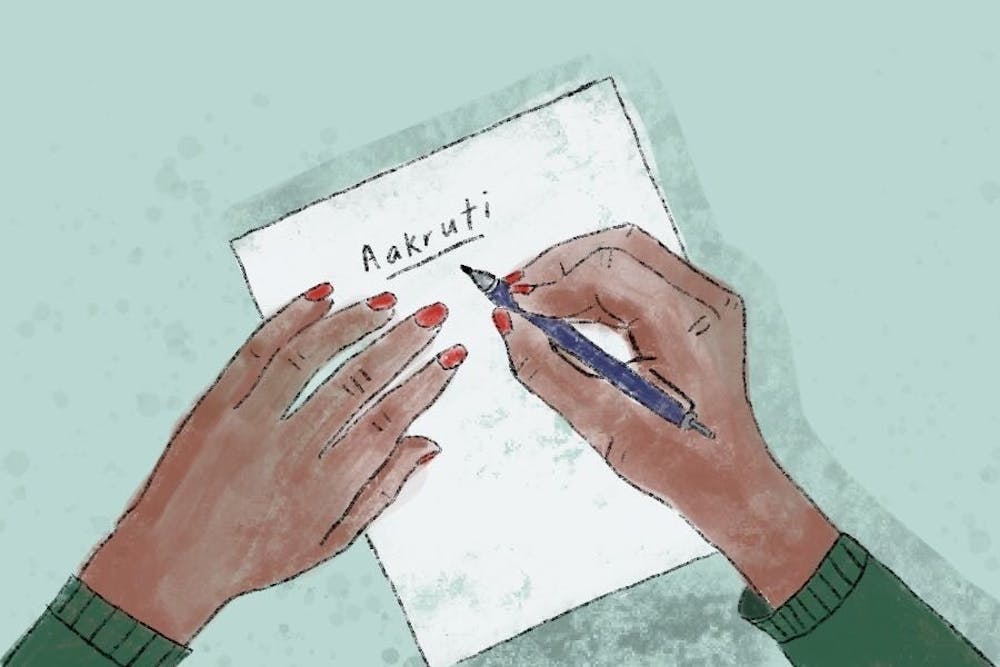If you’ve met me during any part of my adolescence, you probably know me as ‘aa–kroot–ee’. If you’ve had the unfortunate displeasure of meeting me for the first time at any social event where the decibel of the music turns those three syllables into an incoherent mess, you may know me as "AJ."
Neither one of those variations is reflective of the actual name on my birth certificate.
As the famous quote from Romeo and Juliet goes, “What’s in a name?” As someone whose parents decided that the best name for their child growing up in suburban Australia was "Aakruti," I can tell you—a lot more than you think. My first attempts to introduce myself with my actual name (pronounced aak–rith–i) were met with discombobulated, uncertain repetitions back—"Aqua–ti?" "Aak–rit?" They seemed futile. Eventually, I decided ‘Aak–root–ee’ was probably the least awkward sounding of the bunch. I vowed to never be like my parents, in the sense that I would be sure to give my hypothetical child a name that doubled as both white and Indian.
By the time I moved to Singapore around the sixth grade, I’d accepted the consistent mispronunciation, just as incorrect colloquialisms often become part of the dictionary. Any compliments on the prettiness of my name were immediately turned down. To me, the Emmas and Sophias of the world had hit the fucking jackpot. They’d never seen that look on every teacher’s face when they get to your name on the attendance sheet on your first day—that look of confusion, followed by a consonant–by–consonant sounding out that always, always made my name sound a thousand times more convoluted.
Somewhere along the way, my grudge shifted. I no longer hated the mispronunciation. No, I hated my actual name. And despite going to an international school in a country where my mother tongue was one of the four national languages, I treated my culture with a sort of tolerant indifference. I kept it at arm’s length, only considering it relevant when I was around my immediate family. My nationality, according to every legal document I own, was Australian. My ethnicity? More of a bump in the road along the way.
Of course, this came with its own issues. When asked where I was from, I immediately identified Australia as my hometown. This response always evoked the same reaction: a smirk, accompanied by the follow–up question "But where are you really from?" Apparently, shirking my identity did not mean everyone else would do me the same courtesy. I was stuck in a perpetual purgatory—not Australian enough, but also not culturally aware or willing to claim India as my own. If anything, it deepened my disassociation with Indian culture by forcing me to assert one sole country as home.
Keep in mind, I lived in India for a solid three years prior to relocating to Singapore. By all logic, I should’ve instinctively developed a connection to my heritage just by being immersed in it. However, what I saw as negative aspects of the country far outweighed any appreciation I had for the culture. I quickly became fixated on the pollution, the sexism, and the dichotomous relationship between the wealthy and poor present throughout the country. I equated the cultural and the political, further reinforcing my apathetic attitude.
But when I first introduced myself to the girls who would become my future roommates and best friends, they looked me dead in the eye and flatly told me, "That is absolutely not the way to say it."
At Penn, something changed. Given the current inflammatory rhetoric regarding immigrant identity in the United States, it is difficult to not opt to assimilate. But I will say this much. Until I moved to America, to Penn, I had never been truly proud of my culture. It was here that I joined an Indian dance team, and here that I found the people that always insist on saying my name the right way. Penn taught me to see the true value of Indian heritage in a number of ways and magnified my appreciation for the country I once refused to refer to as home. Ironically, here, in this country a thousand miles away, is where I probably feel most connected to the culture I’m actually from.
Of course, I feel fortunate to be surrounded by people from such a varied range of backgrounds and opinions. I also fully acknowledge and appreciate the privilege that has come with exposure to such a plethora of cultures, for I have learned and grown so much because of it. In the same vein, I don’t resent those who still pronounce my name the way I initially introduced it. That was a conscious decision on my part, one that I still sometimes make because it feels like the easy way out. But that deep resentment I felt towards my name? Gone. And all of the discomfort I felt towards my ethnicity no longer exists either.

